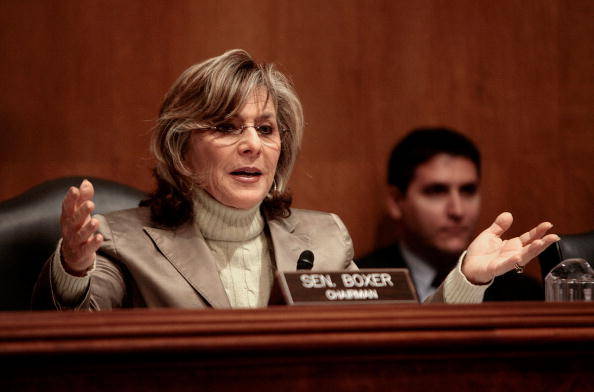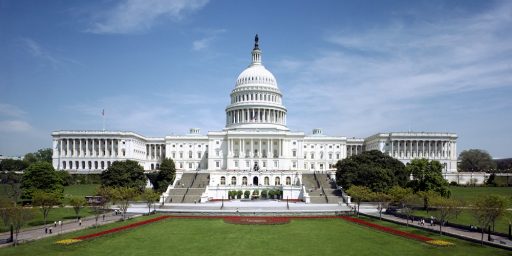Boxer’s Electoral Rebellion
A look back at the last time there was a challenge to a slate of electors.

My previous post noted that the last time at least one member of the House and one Senator agreed to challenge a slate of electors was in 2005 when Senator Barbara Boxer (D-CA) joined in with a group of House Democrats to trigger a debate and vote on Ohio’s slate. This was only the second time in history that such a challenge had taken place under the 1877 law that created the process. The first being in 1969 over an unfaithful elector.
I detailed in my last post why I think Boxer’s actions were substantially different from Hawley’s, but since I know it going to come up over the next several weeks, I thought it would be interesting to note some of the details.
First, it should be noted that the objections were explicitly not about overturning the results. Note the following from SF Chronicle at the time: Boxer delays presidential vote count with protest / Senator, colleague object to Ohio tally — Electoral College confirmation held up.
Boxer and fellow Democrat Rep. Stephanie Tubbs Jones of Cleveland, relying on widespread reports of voting problems on Nov. 2, stopped the count of Electoral College votes with a formal objection to the Ohio results. Their protest, which they said wasn’t aimed at overturning Bush’s victory over Democratic Sen. John Kerry, triggered a debate in the House and Senate on election reform.
Second, John Kerry, who lost the election to Bush, did not support the action (let alone lobby for it, as Trump has done).
Third, there was very little in the way of party support, as the NYT write-up at the time (Congress Ratifies Bush Victory After Challenge) noted:
The challenge cast a spotlight on divisions among Democrats, with party leaders and many in the rank and file distancing themselves from the effort, while black and liberal lawmakers embraced it. The Democratic presidential nominee, Senator John Kerry of Massachusetts, did not support the objection, nor was he on hand to witness it. He was in the Middle East, meeting with troops.
In the end, the House voted 267 to 31 against the challenge. In the Senate, where the vote was 74 to 1, Mrs. Boxer stood alone.
Ultimately, the issue of comparing Boxer’s actions and Hawley’s is going to be about the overall behavior of the parties then and now. In 2005, Boxer’s challenge was treated as a largely fringe action. In 2021, we appear to be on track for a major embrace of Hawley’s action by the GOP.
There are some superficial similarities between then and now:
In many ways, the debate came about because of the relentless efforts of a small group of third-party activists, liberal lawyers, Internet muckrakers and civil rights groups, who have been arguing since Election Day that the Ohio vote was rigged for Mr. Bush.
In the weeks since, those groups have organized rallies and public hearings in Ohio protesting the vote, filed lawsuits contesting Mr. Bush’s victory and demanded a statewide recount that resulted in Mr. Bush’s margin of victory shrinking by 300 votes, to about 118,450. They also protested in Washington on Thursday.
However, in stark contrast to now:
But even Democratic officials in Ohio said that while they wanted improved election practices, they worried that the party was wasting time and money refighting the last election.
“There was a point where this served a purpose,” said Susan Gwinn, chairwoman of the Athens County Democratic Party in Ohio. “But I think we passed that. We need to move on.”
I will admit, I do not recall the challenge nor, really, the controversy surrounding Ohio (save that it was close). I had forgotten there was a recount. I was actively blogging at the time, but since my old site is kaput, I can’t go back and check the archive. As best I can tell, James Joyner did not blog about Boxer’s challenge either.



You know, this seems like more of “don’t pay attention to what (someone) says” from the right.
Hawley doesn’t actually believe there was a problem with the election. As you highlighted in your previous post, he says he doesn’t want to talk down to his constituents. This is having it both ways, big time.
The thing is, speech by a politician is action. It’s what they do. It counts.
The Wayback Machine has this capture from January 7, 2005. Doesn’t seem like you had anything on this challenge. You were attending a conference of some sort, apparently.
https://web.archive.org/web/20050107052208/http://www.poliblogger.com/
@Jay L Gischer:
Josh Marshall touched upon that point a few weeks ago at TPM:
A couple weeks ago Sen. John Cornyn (R-TX) announced that “transparency” was “non-negotiable” in evaluating the prior business dealings of Biden’s foreign policy team. Here is how my pledge operates. John Cornyn won an election and has a vote on all Biden nominees. Biden has to deal with that. Biden should, quite apart from any nonsense from John Cornyn, demand high ethical standards of everyone in his administration. But we know from the last four years that government ethics and official profiteering are fine with Cornyn. None of these things matter to him at all. So he is entitled to his vote. But he is not entitled to any space in our heads taking anything he says seriously or engaging it in any way. Know what you can control and what you cannot and don’t try to control anything in the latter category.
They have their votes they can cast but what they say doesn’t matter in the slightest as they have no integrity on pretty much anything and everything.
IMO the issue should be Boxer was protesting that foreign propaganda had influenced some voters and those foreigners were encouraged by the winner and the Trumpists are claiming that US elections are rigged.
@Paine: To my mind, the much bigger problem was that he wasn’t saying anything then, rather than that he’s saying it now.
What they say counts, and silence is a form of speech.
I certainly don’t remember it so it must have been viewed as pro forma. There were people like Robert Kennedy Jr claiming fraud with the Ohio voting machines for years but, yes, they were largely considered kooks. I don’t recall John Kerry, who certainly had reason to be bitter, ever backing that claim.
@Mikey: I actually did look there as well. I was probably at the Southern Political Science Association. I also see I had a guest-blogger (Steven L., not to be confused with Steven L. Taylor) at the time.
I lived in Ohio at the time. 2004 was the era of Ken Blackwell as Ohio Sec’y of State. There were widespread, well supported, allegations of vote suppression, including inadequate provision of equipment to minority and student polling places. It was also the era of the Diebold voting machines, which did not leave a paper trail and about which there were genuine concerns, including apparent conflicts of interest for Blackwell. Barbara Boxer was not protesting the outcome, but had good cause to protest the conduct of the election in Ohio. Current GOPs are protesting the outcome with no evidence to support their claims of fraud in the conduct of the election.
Even in this post-modern age, the difference between probable cause and none should make a difference.
On Election Day 2004 I was in Columbus OH doing GOTV, so I remember this controversy well. I also recall the disparities in number of voting machines being a big issue. It was rainy and cold that day and I have a vivid memory of people waiting in long lines to vote in the rain… at least in certain precincts.
I also vaguely recall reading a handful of blogs from that time period attempting to show that the shift toward Bush in Ohio in certain counties could have been caused by Diebold or some other tampering if you squinted at it just right. Despite wanting to believe, I remember being very unconvinced by that line of argument — it was similar to the current MAGA theory around “bellweather” counties.
However, I *do* feel like 2000 and 2004 were key moments on the left where lots of people started thinking more about structural changes to how elections are run. What do we need to do to get rid of the EC? To ensure auditable paper trails? To end voter suppression? It’s not surprising that Democrats would turn to policy white papers after close election losses… but I guess that’s still way better than conspiracy mongering that we’re seeing from the right.
Hopefully, the Dems will reintroduce H.R. 1 again in the new Congress.
It’s not widely recognized that Hawley is objecting to states “not following their own laws” – claims that have been considered and dismissed by the supreme court of Pennsylvania, which is the only state he’s actually named. Hawley hasn’t explained why he believes Congress should be sitting as a court of appeal from state supreme courts.
He’s explicitly NOT alleging widespread fraud, although the clowns performing for the cameras in the House will no doubt conflate the issues.